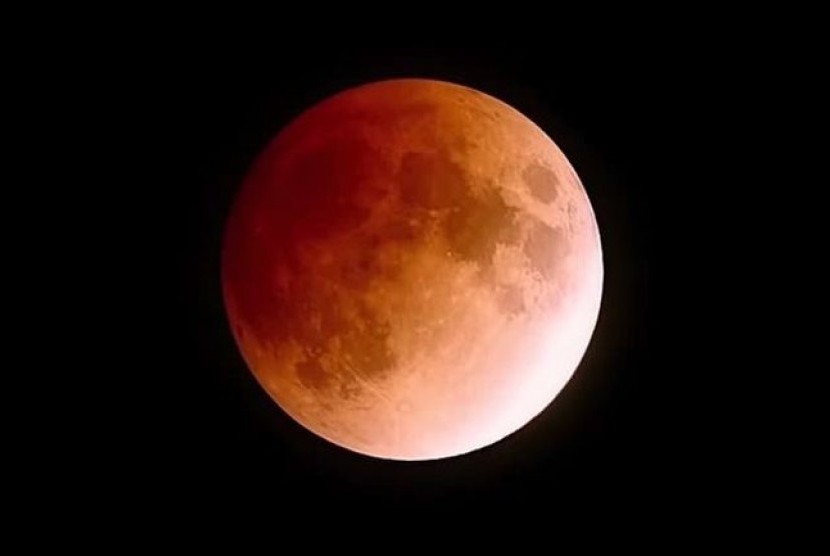REPUBLIKA.CO.ID, JAKARTA -- Indonesia will witnesses a super blue blood moon eclipse on Jan 31 from around 6 p.m. until 11 p.m. Western Indonesian Standard Time (WIB), with the peak from 8:29 p.m. to 9:07 p.m. WIB. This spectacular lunar event, a rare natural phenomenon that had occurred 152 years ago, features the second full moon of the month, also known as the Blue Moon.
The event will coincide with a total lunar eclipse, which is often referred to as a "blood moon" since the moon turns a reddish or copper color when it passes through the Earth's shadow, according to Space.com.
Furthermore, the Jan 31 full moon occurs during perigee, the moon's closest approach to Earth in a single orbit, which means that its diameter will appear about seven percent larger and 14 percent brighter than usual, making it a super moon. Super moons have been blamed for everything from madness to flooding.
This is the first time in over 150 years that the three lunar events will coincide, according to a statement from NASA.
Also read: Seven best places to see total lunar eclipse in Jakarta
The full moon on Jan 31 is the second one to occur in 2018, after the first on January 2, 2018. Hence, the second one is called the Blue Moon. However, the total lunar eclipse is the first to occur this year. In 2018, Indonesia will witness two total lunar eclipses, respectively on Jan 31 and July 28.
In Indonesia, the best locations to watch the super blue blood moon and the total lunar eclipse are Bandung, Sumedang, and Garut in West Java Province; Pasuruan in East Java Province; Biak in Papua Province; Pontianak in West Kalimantan Province; and Bukittinggi in West Sumatra Province.
In fact, the super blue blood moon and lunar eclipse can be seen across Indonesia if the skies are clear and not covered by clouds. "With one condition, which is that the sky should be clear," Thomas Djamaluddin, chairman of Indonesia's National Institute of Aeronautics and Space, wrote recently.
Djamaluddin expressed hope that the extremely rare natural phenomenon would serve to educate the public on science. A similar view was also voiced by Governor of Jakarta Anies Baswedan, who was the former education minister.
Baswedan has issued an instruction to teachers to utilize the upcoming super blue blood moon and total lunar eclipse to educate students. "I have issued an instruction to the (Jakarta) education office to order teachers to utilize the lunar eclipse phenomenon to educate students, particularly on science and technology and not only astronomy," Baswedan remarked on Jan 30.
The governor has also instructed the local tourism and culture office to open tourism facilities to the public keen on witnessing the rare natural phenomenon.
Tourism facilities to be open to the public for viewing the total lunar eclipse include the Planetarium at the Taman Ismail Marzuki Park, National Monument, Setu Babakan Batavian Cultural Kampong, Fatahillah Park, the Jakarta old town located in West Jakarta, Seribu Islands, Indonesian in Miniature Park, and Ancol Dream Land.
Several facilities and equipment for observation will be made available to the public. Monas located in Central Jakarta, for instance, will allow the entry of some 500 people to observe the eclipse.
"Thus, Jakartans who want to watch the phenomenon could go to these places that are open to the public. We hope that the sky would be clear and there would be no cloud and rain during the phenomenon, so that observation is not affected," he stated.
The Jakarta administration will also provide facilities for mosques to perform special prayers for the total eclipse. Both Baswedan and his deputy Sandiaga Uno plan to watch the total lunar eclipse along with the public.
No enthusiastic skywatcher ever misses a total eclipse of the moon, according to information on space.com, Skywatching.
The spectacle of the lunar disk slipping into Earth's shadow and turning a deep shade of red is often more striking and engaging than one might think. What's more, when the moon is entering into and later emerging out of Earth's shadow, secondary phenomena may be overlooked, but these additional features of the eclipse are worth looking out for, Space.com further wrote.
In addition to Indonesia, the total lunar eclipse will be visible across more than half of the planet. The full eclipse will be visible on the U.S. West Coast, Hawaii, Alaska, Western Canada, Eastern Asia, Australia, and New Zealand.
In March 2016, millions of Indonesians had witnessed a rare total solar eclipse that turned morning into night in some areas. The event had become a scientific tourism event, attracting several foreign and domestic tourists.
In 2018, Indonesia is also expected to witness three partial solar eclipses, respectively on Feb 15, July 13, and Aug 11.


